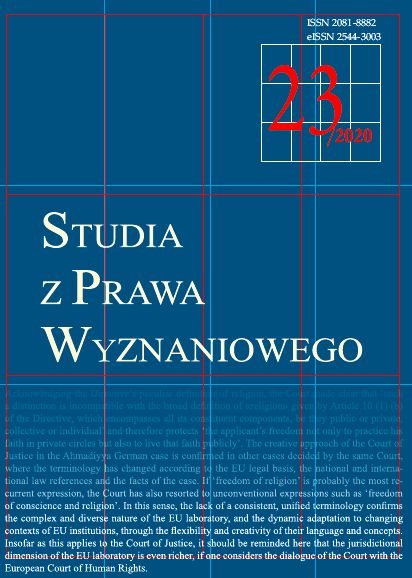Stosunek kościelnej ochrony danych osobowych do RODO – uwagi na marginesie postanowienia Krajowego Sądu Pracy w Norymberdze z dnia 29 maja 2020 roku, 8 Ta 36/20
Personal data protection by churches vs. GDPR – some remarks on the judgment of the National Employment Tribunal of Nuremberg of 29 May 2020, 8 Ta 36/20
Author(s): Bernard ŁukańkoSubject(s): Law, Constitution, Jurisprudence, Constitutional Law, Civil Law, International Law, Human Rights and Humanitarian Law, Court case
Published by: Katolicki Uniwersytet Lubelski Jana Pawła II - Wydział Prawa, Prawa Kanonicznego i Administracji
Keywords: personal data protection;German constitutional law; Catholic Church in Germany; Interdiocesan Tribunal for the Protection of Personal Data; ochrona danych osobowych; niemieckie prawo konstytucyjne;
Summary/Abstract: The aim of the study is to discuss the judgment of the National Employment Tribunal in Nuremberg dated 29 May 2020, 8 Ta 36/20, and to consider the effects of the ruling on the protection of the rights of individuals. The examined adjudication is one of the first court rulings referring to Article 91 para. 1 of GDPR and a church law (of the Catholic Church in Germany) governing the protection of personal data. The study not only aims to assess whether the Act on Church Protection of Personal Data of the Catholic Church in Germany (kirchliches Datenschutzgesetz – KDG) complies with the requirements of GDPR, but it primarily focuses on the question of the jurisdiction of the national court (employment tribunal) or the church tribunal (Interdiocesan Tribunal for Protection of Personal Data seated in Cologne acting pursuant to the Regulations of the Church Judiciary for Personal Data Protection – in German: Kirchliche Datenschutzgerichtsordnung – KDSGO) to hear a claim for damages of an employee of the Catholic Church who invoked sharing his personal data with unauthorized persons as the basis for the claim. The findings are then discussed in a broader comparative context of the Polish constitutional model of the relations between the state and churches and other religious organizations.
Journal: Studia z Prawa Wyznaniowego
- Issue Year: 2020
- Issue No: 23
- Page Range: 153-176
- Page Count: 24
- Language: Polish

